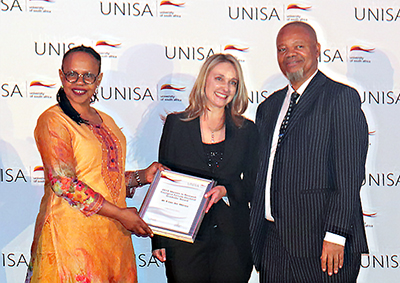
The African college of excellence in the social and human sciences

Prof Thenjiwe Meyiwa (Vice-Principal: Research, Postgraduate Studies, Innovation and Commercialisation) and Prof Mandla Makhanya (Principal and Vice-Chancellor) congratulate Dr Sintechè van der Merwe (centre) as the youngest female PhD recipient working at Unisa in 2019.
Excellence has always been part of Dr Sintechè van der Merwe’s academic endeavours. So it comes as no surprise that she is the recipient of Unisa’s 2019 Youngest Female Doctoral Graduate Award. Having obtained her Sociology PhD at age 32, Van der Merwe, a senior lecturer in the Department of Sociology in the College of Human Sciences, was the youngest female PhD recipient working at Unisa in 2019.
With a PhD in Sociology from the University of Johannesburg, a Master’s in Gender Studies (with distinction) from the University of Pretoria, her research specialises in gender in the workplace. She has co-published with other authors for the international journal, Community, Work & Family. Having recently completed her PhD, she hopes to start publishing as soon as possible on the findings of her thesis, entitled How women gain and retain management positions: A study of South African female MBA graduates.
Feeling incredibly honoured and grateful to have received this award, Van der Merwe says that the academic journey is tremendously rewarding, but at times one needs to make sacrifices, specifically in terms of time that one can spend with family and loved ones.
"This award belongs to them as much as it belongs to me, since it is only through their continuous love and support that I was able to persevere and succeed. This award will always remind me that through hard work and a good support system, anything I set my mind to is possible."
Van der Merwe says that since enrolling for her first degree in 2005, she had always aspired to complete her PhD before she reached the age of 35. And she is ecstatic to have done so. "My research focuses on women in leadership and it is due to the great inequalities that continue to exist in our country and society as a whole that I was inspired and motivated to complete my studies and to start contributing to the field as soon as possible."
"Gender hierarchies and stereotypes are further entrenched, and perpetuate the idea that sites of power and key decision making automatically belong to men."
She says that her research aims to inspire women to pursue positions of leadership within their organisations, communities and countries. "In Africa, advances made in educational attainment in recent decades have enabled women to gain entry into corporate employment. The problem, however, is that these women appear to remain at lower occupational levels and very few enter the managerial ranks of organisations."
She says this is where the importance of her sociology research comes in. "I am concerned about highly educated women being relegated to the lower echelons of the corporate world. This raises questions about human rights, gender transformation and gender identities."
Van der Merwe says that even if women believe that progress in this domain is possible, the unfortunate reality is that it is only up to a certain point. "Therefore, gender hierarchies and stereotypes are further entrenched, and perpetuate the idea that sites of power and key decision making automatically belong to men."
She is hoping that her study of what actually occurs in the current workplace can lead to discussions and ideas suggesting remedies for positive change.
Outside of academia, Van der Merwe considers herself a bit of a "foodie", and loves to go for afternoon runs to clear her mind and relax. Her interests range from reading on subjects such as advances in information technology, bio-technology, world history and macro-economics.
She also shares a quotation that has had a major influence on her: "Amateurs rely on inspiration. Professionals rely on their craft."
"This quotation is a constant reminder to me that it takes dedication and perseverance to get things done properly, and that it is a daily endeavour. It helps me to commit and work towards my goals every day," concluded Van der Merwe.
* By Rivonia Naidu-Hoffmeester, Communications and Marketing Specialist, College of Human Sciences
Publish date: 2020/03/11